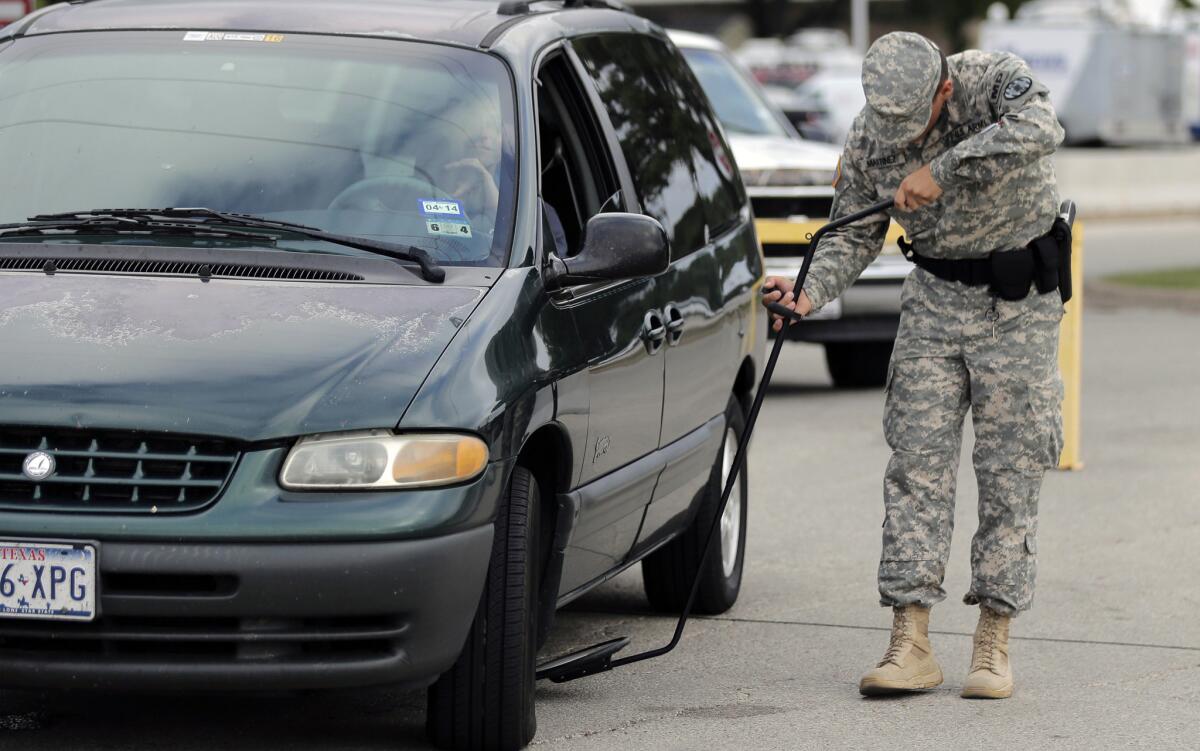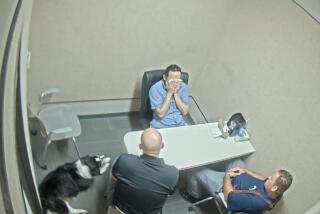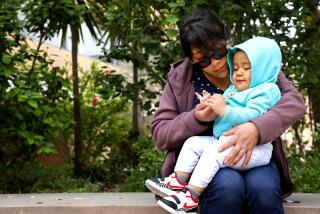Relatives of Ft. Hood victims recall carnage: âI went numbâ

FT. HOOD, Texas â The military prosecutor was asking Philip Warman about the moment he realized his wife and partner of more than 20 years had been killed in the mass shooting at this central Texas Army post on Nov. 5, 2009.
Warman, a lawyer dressed in a blue jacket and red tie, sat silent on the stand at first. His wife, Lt. Col. Juanita Warman, 55, had been an Army nurse, mother of five, grandmother of eight. Witnesses testified at trial this month that after she was shot, as she lay bleeding, she said she knew she was dying.
And now, on the stand, her husband had to relive it all. His wifeâs killer, Maj. Nidal Malik Hasan, sat a few feet away.
Warman cleared his throat a few times, tilted back his head of thick white hair before answering.
âIt was like I had something ripped out of me, and I started drinking,â he said, âI pretty much drank until the following June.â
Hasan was convicted last week of 13 counts of premeditated murder in connection with the shooting, the deadliest attack on a U.S. military base. Hasan, who represented himself at trial, has not indicated plans to call witnesses during the sentencing phase of the court-martial. It was unclear whether he will speak.
Warman was among 19 victims and relatives to speak before prosecutors rested their case Tuesday. Many witnesses said they struggled after the shooting with emotional problems, depression and suicidal thoughts. Some attempted suicide. Couples divorced. Children became estranged. Families divided.
Warman told the jury that, after the shooting, he asked a friend to remove any weapons from his house in Havre de Grace, Md.
âI didnât trust myselfâ not to harm himself, he said, even though, âI was doing it with slow weapons, with alcohol.â
Eventually, he checked himself into rehab, and hasnât had a drink since, he said. He buried his wife at Arlington National Cemetery, next to Maj. L. Eduardo Caraveo, another victim of the shooting.
âSir, when you go to AA meetings, they give you coins,â a military prosecutor said, âWhat would you do with yours?â
Warman grew silent again.
âJust let me catch my breath,â he said, and then: âI would push them into the ground of my wifeâs grave.â
Hasan looked on as he spoke without reacting.
He struck the same pose as widow Joleen Cahill took the stand after weeks of watching the trial, a thin figure in a cardigan and skirt, long brown hair going gray. She began to tell the jury about her husband of 37 years, the lone civilian casualty.
She met Michael Cahill, 62, back in 1968, at a greenhouse near where the two were in school in eastern Washington. He had been an Army warrant officer. The couple had three children, moved to Texas and built a home. After Cahill retired in 1995, he went to work at Ft. Hood as a physician assistant.
A month before the shooting, Cahill suffered a heart attack. Doctors advised him to take more time off, but he insisted on returning to work, his wife said.
The night of the shooting, when she was notified of his death, Cahill said she initially refused to accept it.
âI tried to deny it to them and say no, the news said it was all soldiers, Mike was a civilian,â she recalled on the stand.
After that, she said, âI went numb. I just donât remember very much ... a lot of that night was blank.â
She had an asthma attack, and was briefly hospitalized.
She kept his cellphone for her children to call, hear his voice on the message and tell him about their lives.
Cahill kept her husbandâs den as he left it.
She would still listen for his steps on the porch, for the sound of the French doors opening.
âThere were no footsteps anymore,â Cahill said.
For the first time in 60 years, she was alone.
Her son, who has Aspergerâs syndrome, was âless functional.â Her daughter had memory problems. Family members grew angry, divided.
âWeâre fighting to get back together and to get our lives back on track,â Cahill said.
Cahill struggled, too. She was coping, but, she said, one night as she was driving, âI had a thought I shouldnât have.â
She didnât elaborate.
But she rejected thought, deciding instead, âThe shooting is not going to destroy me and my family.â
âHe is not going to win,â she said Tuesday as she faced Hasan. âI am in control.â
ALSO:
Washington, D.C., drivers ranked worst, L.A. not far behind
Delbert Beltonâs death: 2 Spokane teens to be tried as adults
Largest New Mexico county to issue same-sex marriage licenses
Follow L.A. Times National on Twitter
More to Read
Sign up for Essential California
The most important California stories and recommendations in your inbox every morning.
You may occasionally receive promotional content from the Los Angeles Times.











